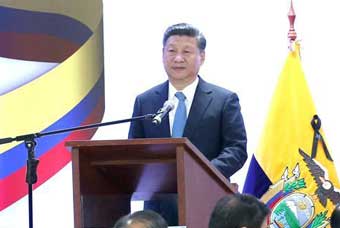BEIJING, Jan. 6 (Xinhua) -- China has remained the world's major growth engine in 2016, shoring up global economic growth through such channels as trade, market and investment.
The latest report of the International Monetary Fund showed that China contributed 1.2 percentage points to global economy growth in 2016, while the United States contributed 0.3 percentage points and Europe 0.2 percentage points.
China's economy is shifting toward a development model of lower rate and higher quality, while structural reforms allow its economy to upgrade and eventually unleash new vitality and continue to serve as an engine of global economic growth.
Data showed that China became the single largest contributor to global economic growth in 2009 and its contribution to world growth has since been leading other economies.
Chinese imports have amounted to 9 trillion U.S. dollars over the last five years, and the country, with a huge demand, has helped drive the economic growth of countries worldwide.
In the next few years, China's economy is expected to maintain its high speed of growth, and its immense demand for raw materials and manufactured goods will provide strong support for growth in many countries.
From the perspective of outbound investment, China has become an important source of foreign investment in many countries. From January to November 2016, China's total foreign investment was 1,070 billion yuan (153 billion U.S. dollars at current price), representing a substantial increase of 55 percent from 2015.
With the implementation of the Belt and Road Initiative and the operation of the Asian Infrastructure Investment Bank (AIIB), outbound Chinese investment is expected to grow further.
In the meantime, foreign investment into China was estimated at 785 billion yuan (113 billion dollars) in 2016, ranking the first among developing countries for 25 consecutive years. China remains one of the world's most attractive investment destinations despite the world economic slowdown, growing protectionism and strong investment headwinds globally.
For the world's economic growth, China's sustained growth is important, but the joint contributions of countries worldwide is even more critical.
After years of adjustment since the financial crisis, the U.S. economic indicators including employment, growth rate and deficit have greatly improved, and the Federal Reserve has started to gradually raise interest rates. However, the Euro zone and Japan's economies are still struggling to recover.
When it comes to making contributions to world growth, the developed economies still have a lot of work to do including stepping up efforts in promoting structural reforms and reducing trade barriers.
As for China, whose economy is entering the "deep-water zone" and a "critical period," how to build a solid foundation for its growth through reform remains a top priority.
Observers believe that China has made significant achievements in its opening-up endeavor and financial system reforms.
The country's service industry is rising rapidly, growing faster than its industrial production. China is also pushing ahead supply-side reforms, thanks to which, new sources of economic growth are constantly emerging.
China needs to pay more attention to its internal challenges and dedicate to improving its own economic strength so as to maintain its leading role in helping promote world economic growth, observers say.














